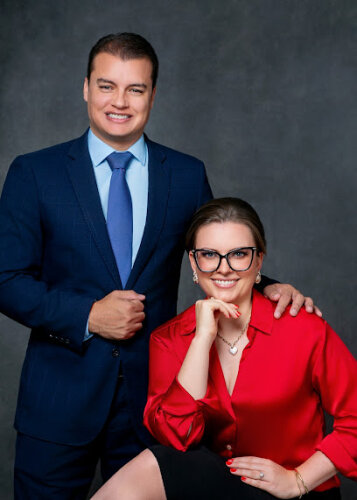Best Nursing Home Abuse Lawyers in Blumenau
Share your needs with us, get contacted by law firms.
Free. Takes 2 min.
List of the best lawyers in Blumenau, Brazil
About Nursing Home Abuse Law in Blumenau, Brazil
Nursing home abuse refers to any intentional or negligent act by caregivers or staff in elderly care facilities that results in harm or risk of harm to residents. In Blumenau, Brazil, the rights and protections of elderly individuals are governed by both federal and municipal laws, ensuring their physical and psychological integrity. Abuse can include physical violence, psychological or emotional harm, sexual abuse, neglect, abandonment, or financial exploitation. Brazilian law takes these concerns seriously and provides specific channels for protection and accountability.
Why You May Need a Lawyer
Victims of nursing home abuse and their loved ones often face significant legal, medical, and emotional challenges when confronting such situations. You may need a lawyer if you:
- Suspect or have evidence of physical, emotional, or financial abuse or neglect in a nursing home in Blumenau
- Encounter resistance or lack of cooperation from a facility when raising concerns
- Need guidance on how to formally report abuse or navigate administrative procedures
- Seek compensation for damages suffered by an elderly loved one
- Require protection orders or urgent legal interventions for the welfare of the resident
- Want to understand your legal rights and options under local and federal law
Legal professionals in this field can help gather evidence, represent you before authorities, and ensure that your loved one's rights are protected throughout the process.
Local Laws Overview
Laws at the federal level, such as the Elderly Statute (Estatuto do Idoso - Law 10.741/2003), set forth crucial protections for elderly Brazilians, including those residing in nursing homes. Locally, Blumenau follows both the general terms of the Elderly Statute and specific municipal norms related to elderly care and rights.
Key aspects include:
- Right to Dignity: Elderly individuals are guaranteed fundamental rights to life, health, food, education, culture, and respect.
- Obligation to Report: Anyone who becomes aware of abuse or neglect of an elderly person must report it to the appropriate authorities.
- Public Oversight: Municipal, state, and federal bodies monitor and inspect nursing home facilities, investigating reported cases of abuse or misuse of funds.
- Criminal Penalties: Abuse can lead to criminal charges against offenders, with prison time and fines, depending on the severity and nature of the violation.
- Civil Actions: Victims or their families may seek compensation for harm caused by abusive or negligent conduct.
Frequently Asked Questions
What signs indicate potential nursing home abuse?
Common signs include unexplained injuries, frequent falls, sudden behavioral changes, malnutrition, lack of hygiene, depression, unexplained financial transactions, or withdrawal from social activities. If you notice any of these, it may be time to investigate further.
How do I report nursing home abuse in Blumenau?
Abuse can be reported directly to the local branch of the Public Prosecutor’s Office (Ministério Público), to the police, or to the Municipal Council for the Rights of the Elderly (Conselho Municipal do Idoso). The “Disque 100” hotline is also available nationwide for elder abuse reports.
What legal protections exist for nursing home residents?
Residents are protected under the Elderly Statute, which ensures rights to physical integrity, health, social participation, and access to justice. Nursing home facilities are legally obligated to provide a safe, respectful, and healthy environment.
What are the penalties for elder abuse in nursing homes?
Penalties vary from fines to imprisonment, depending on the type and severity of abuse. Offenders can also be banned from working with elderly individuals and face civil lawsuits for damages.
Can I move my loved one immediately if I suspect abuse?
If you have reason to believe your loved one is in immediate danger, you should involve authorities to ensure their safety. After formal reporting, it is possible to arrange for temporary or permanent transfer, with guidance from social services and legal counsel.
What evidence is important when pursuing a case of nursing home abuse?
Important evidence includes photographs of injuries, medical reports, witness statements, communication logs, financial records, and any correspondence with nursing home staff or management. A lawyer can help you gather and organize these documents.
Is emotional or psychological abuse actionable under the law?
Yes. Psychological abuse, including isolation, humiliation, harassment, or threats, is recognized as a form of abuse and can be reported and prosecuted under Brazilian law.
What if the nursing home threatens retaliation?
Retaliation against residents or their families for making a report is itself prohibited and can be addressed through additional legal measures, such as protective orders or immediate intervention by authorities.
Can I sue a nursing home on behalf of my incapacitated relative?
Yes. If a resident cannot represent themselves, a legal representative or family member may initiate civil proceedings on their behalf, usually with the support of a lawyer.
How long does it take to resolve a nursing home abuse case?
The timeline depends on the complexity of the case, the amount of evidence, cooperation by parties, and the courts’ workload. Some cases may be resolved in a few months, while others may take longer, especially if criminal charges are involved.
Additional Resources
If you or someone you know needs help with nursing home abuse in Blumenau, the following resources can provide assistance:
- Disque 100 Hotline: Nationwide channel for reporting elder abuse 24 hours a day.
- Blumenau Municipal Council for the Rights of the Elderly (CMDI): Receives and investigates complaints and provides guidance for families.
- Public Prosecutor’s Office (Ministério Público do Estado de Santa Catarina): Handles criminal and civil cases involving elder abuse.
- Municipal Social Assistance Department: Offers support services and coordinates with other agencies for victim protection.
- Police Stations (Delegacia de Polícia): For immediate assistance in emergency situations or to file a police report.
- State and Municipal Ombudsman (Ouvidoria): Provides a channel for complaints against public institutions and services related to elder care.
Next Steps
If you suspect or have confirmed nursing home abuse, act quickly and carefully:
- Document all signs of abuse or neglect, including photographs, detailed notes, and witness contact information.
- Contact local authorities or one of the resources listed above to report the incident and seek immediate protection for your loved one.
- Consider consulting with a lawyer who specializes in elderly rights or civil and criminal liability in Blumenau, who can explain your legal options, prepare your case, and advocate for your interests.
- Follow up regularly with authorities and your legal representative to ensure the case progresses and your loved one remains safe.
Early action and legal support are critical to stopping abuse, protecting residents, and holding wrongdoers accountable under the law.
Lawzana helps you find the best lawyers and law firms in Blumenau through a curated and pre-screened list of qualified legal professionals. Our platform offers rankings and detailed profiles of attorneys and law firms, allowing you to compare based on practice areas, including Nursing Home Abuse, experience, and client feedback.
Each profile includes a description of the firm's areas of practice, client reviews, team members and partners, year of establishment, spoken languages, office locations, contact information, social media presence, and any published articles or resources. Most firms on our platform speak English and are experienced in both local and international legal matters.
Get a quote from top-rated law firms in Blumenau, Brazil — quickly, securely, and without unnecessary hassle.
Disclaimer:
The information provided on this page is for general informational purposes only and does not constitute legal advice. While we strive to ensure the accuracy and relevance of the content, legal information may change over time, and interpretations of the law can vary. You should always consult with a qualified legal professional for advice specific to your situation.
We disclaim all liability for actions taken or not taken based on the content of this page. If you believe any information is incorrect or outdated, please contact us, and we will review and update it where appropriate.










